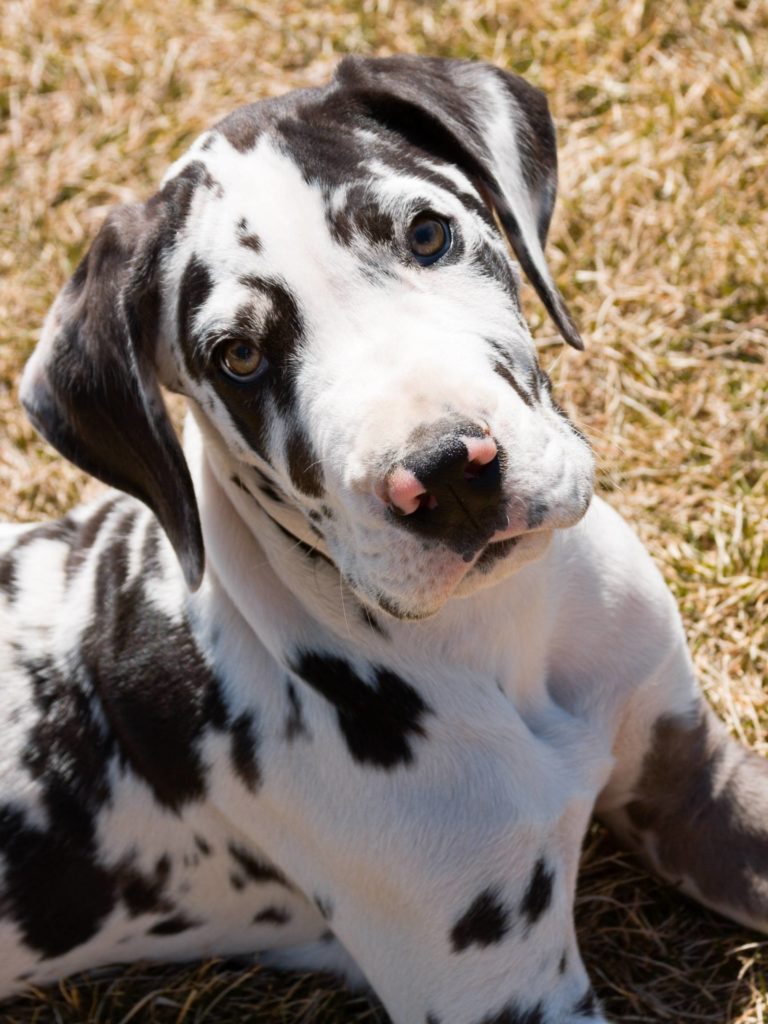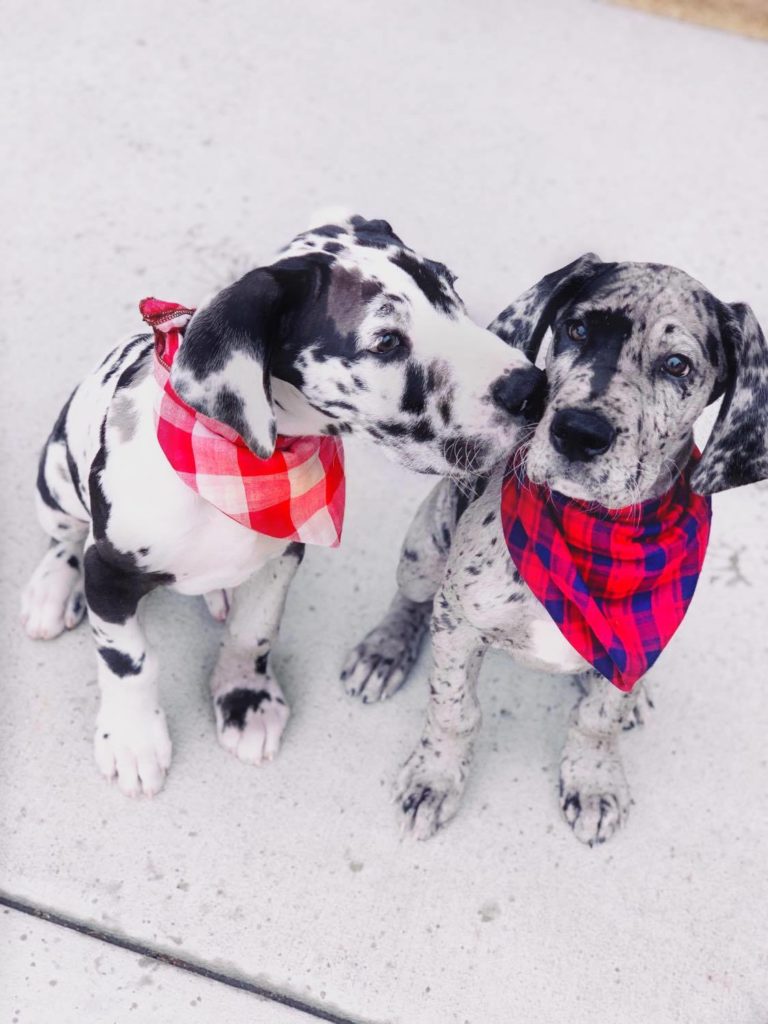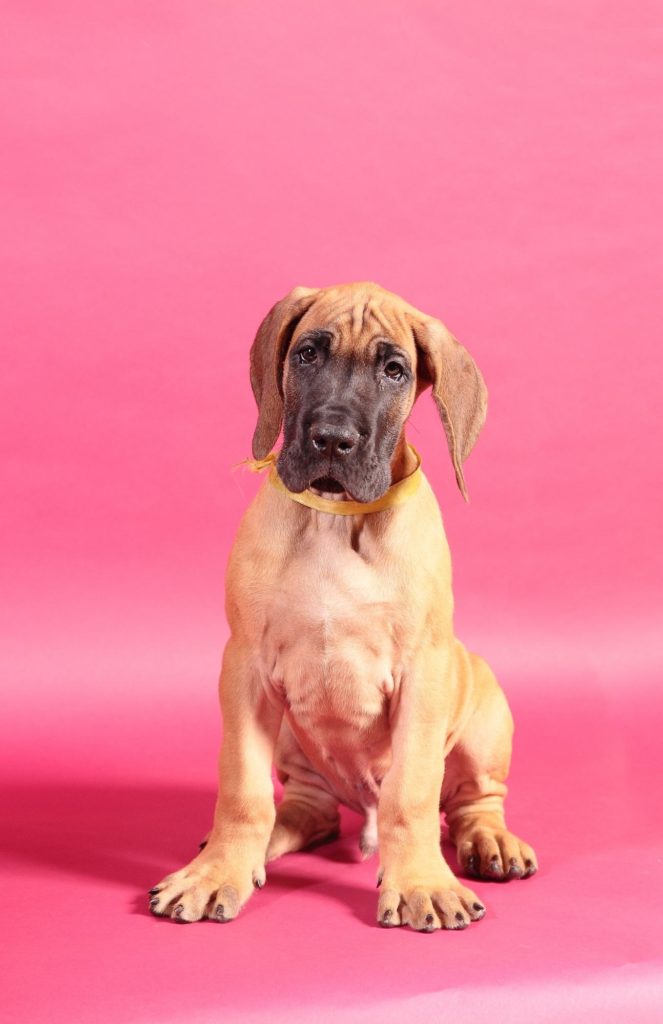I’m going to jump straight into the deep end with this one. Should Great Danes have puppy food?
Yes. Without a question.
This answer may surprise you! Today I’m going to dig into the science of giant-breed nutrition and bust some pet food myths (that just won’t die) in the Great Dane community.
Great Dane puppies should be fed a large or giant breed puppy food until 18-24 months of age.
Ready to understand why? Let’s dig in!

Problematic Great Dane Nutrition Advice
Visit just about any Great Dane community on Facebook and ask what to feed a Great Dane puppy, then prepare to be overwhelmed.
People are actually very passionate about this issue! Here are some common responses:
- “NO PUPPY FOOD!”
- “My vet said to feed puppy food, not adult”
- “Ask your breeder, not your veterinarian”
- “Protein levels must be below 24%”
- “Puppy food is bad! Never feed puppy food!”
- “Adult food is for adults, not puppies. Feed puppy food”
- “Great Danes are giant breed dogs, not large breed dogs, they must have adult food”
- “I just feed my Danes fresh meat, they used to be wolves, kibble is trash!”
So on, and so forth. The “no puppy food ever” people tend to be particularly emphatic.
This kind of information can be confusing to Great Dane owners, especially because so much of it is in direct contradiction to itself. What a headache!

Why Should Great Danes Have Puppy Food
We believe that all of this back and forth is unnecessary and harmful to Great Danes. It is 2022 (actually, almost 2023 as of this writing) and we have much better options when it comes to feeding giant breed puppies than we did even just 15 years ago.
A small handful of dog food companies (Purina, Hill’s, and Royal Canin in particular) have dedicated some legitimate resources towards understanding large and giant breed puppy growth.
20 years ago, “All Life Stages” (and in some cases, adult formulas) were actually among the only safe options for feeding Great Dane puppies.
These days we have some incredible options in puppy foods that were designed to support slow, even bone and joint growth in addition to muscle, tendon, eye, gut, and brain health.
I’m going to dig into this more below, but here is our list of approved Great Dane puppy foods:
- Purina Pro Plan Large Breed Puppy – any flavor!
- Purina Pro Plan Sensitive Skin & Stomach Large Breed puppy – TOP PICK, salmon-based
- Eukanuba Large Breed Puppy (Great for active and sporting dogs)
- Purina One Large Breed Puppy (Excellent budget option)
- Hill’s Science Diet Puppy Large Breed
- Royal Canin Giant Puppy Dry Dog food (to age 12 months) – TOP PICK, PREMIUM OPTION
- Royal Canin Giant Junior Dry Dog food (8-24 months)
- Purina Large Breed Puppy Chow
Check out THE GIANT DOG FOOD PROJECT to compare brands and values.

The Problem with Adult Food for Great Dane Puppies
The reason adult foods were considered the ‘gold standard’ for so long is because anecdotally, breeders noticed that their puppies had fewer growth problems (such as knuckling) when being fed adult foods.
In general, adult foods tend to have lower protein, fat, and calories per cup than many puppy foods, and thus, kept Great Dane puppies from growing too quickly.
To put it simply, the intent behind feeding adult food to Great Dane puppies was to starve them of nutrition. In doing so, they could better control growth rates.
The thing is, we don’t have to do this anymore. Some puppy foods have been reformulated and designed specifically to support large and giant breed growth. They have the correct protein/fat/amino acid/nutrient levels and balanced calcium/phosphorus.
People who hold onto this old idea about only feeding adult foods to Great Dane puppies are deliberately ignoring the current science and research on this topic.

Why are Puppy Foods Good for Great Danes?
Unlike comparable adult formulas, well-researched puppy foods from Purina, Hill’s, Eukanuba, or Royal Canin have been designed specifically for this.
Adult foods work in a way by restricting calorie, fat, and protein intake. While this may minimize the chance of overfeeding and the resulting development of growth disorders in fast-growing giant breed puppies, many adult formulas actually do not provide enough balanced nutrition to support holistic growth.
Growing Great Dane puppies need support for their bones, muscles, tendons, ligaments, skin, brain, and eyes. These are all things that may actually suffer as a result of being fed adult formulas from a young age.
Brittle bones, poor overall conformation, dry skin, chronic loose stools, extreme lankiness, sensitivities, and poor muscle development can all be related to not receiving the right nutrition.
Modern large and giant breed puppy foods have been reformulated to support slow, even growth and the development of the entire body from head to tail.

How Long Should Great Danes Eat Puppy Food
This next answer may also surprise you.
As long as you have chosen a science backed large or giant breed puppy food from the list below, your Great Dane puppy should remain on puppy food until 18-24 months of age.
Veterinarians and veterinary nutritionists, who are the experts on this topic, agree.
- Purina Pro Plan Large Breed Puppy – any flavor!
- Purina Pro Plan Sensitive Skin & Stomach Large Breed puppy – TOP PICK, salmon-based
- Eukanuba Large Breed Puppy (Great for active and sporting dogs)
- Purina One Large Breed Puppy (Excellent budget option)
- Hill’s Science Diet Puppy Large Breed
- Royal Canin Giant Puppy Dry Dog food (to age 12 months) – TOP PICK, PREMIUM OPTION
- Royal Canin Giant Junior Dry Dog food (8-24 months)
- Purina Large Breed Puppy Chow
Check out THE GIANT DOG FOOD PROJECT to compare brands and values.
Remember, Great Dane puppies are NOT adult dogs. Just because they are bigger than most dogs by 3-4 months of age doesn’t mean that adult nutrition is correct for them. They are still growing rapidly at that stage and every ounce of balanced nutrition counts.
NOTE: In pet foods, both large and giant breed dogs are defined as one in the same as they have identical nutritional requirements. While statements from the FDA and AAFCO may only say “large breed”, this is meant to include all dogs that are 70 lbs or more as adults.
Still not convinced? Here are some articles that may be of interest to you:
https://vetnutrition.tufts.edu/2021/11/whats-the-best-food-for-your-new-puppy/
https://vetnutrition.tufts.edu/2022/01/growth-guide-keeping-your-puppy-on-the-right-track/

How Much Should I Feed a Great Dane Puppy?
While modern puppy foods are safe and beneficial to feed your Great Dane puppy, one piece of advice is still very true.
It is extremely important that you do not overfeed your puppy! Too much food can lead to growth disorders, obesity, and chronic loose stools when using any formula (including adult foods).
We recommend offering 3-4 small meals each day until 4-6 months of age, then 3 meals each day until 9 months of age, at which point you can switch to 2 meals each day. Encourage slow, stress-free eating.
Use kibble as training treats whenever possible.
The amount depends a lot of the food you feed (higher quality foods such as Pro Plan and Royal Canin will require that you feed less), growth spurts, and the metabolism of your dog. The feeding chart on the back of the bag is an excellent guide to get you started.
Then, adjust intake accordingly! If you see that your puppy is becoming heavy or growing too fast, cut things back. If your puppy seems to be hungry and asking for more, don’t be afraid to let them eat a few larger portions!

Leave a Reply